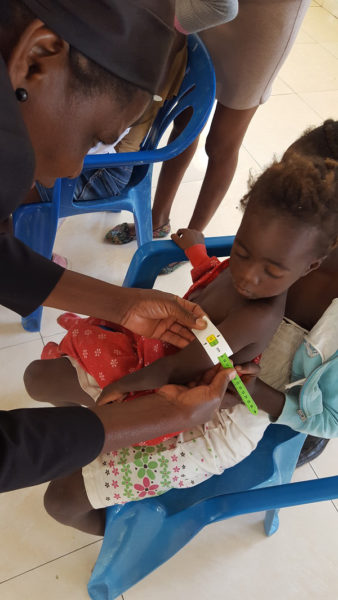Anglican, Episcopal dioceses together support life-saving work in AngolaPosted Dec 13, 2016 |

A child screened with moderate-acute malnutrition during a Mothers Union training on identifying malnutrition. Photo: Gertrude Wafula
[J.C. Flowers Foundation] A prolonged drought in Cunene Province, Angola, has led to food insecurity and extremely high levels of stunting and malnutrition among the population.
El Niño effects and four seasons of lower than average rainfall have affected more than 1.4 million people, including 756,000 children in the Southern African country. In the three most affected provinces, including Cunene, more than 800,000 people are food insecure, and an estimated 95,538 children under age 5 require treatment for severe malnutrition, according to the United Nations Children’s Fund.
The Anglican Diocese of Angola, the Episcopal Diocese of New Hampshire, and the dioceses of Manchester and London in England, are working in partnership to support Mothers Union members in delivering life-saving malnutrition interventions to children in the region.
In times of extreme drought, identifying malnourished children early saves lives. To date, the four Anglican Dioceses have supported the training of 40 Mothers Union members so they can screen children in their own communities and refer children to health facilities. It is anticipated that Mothers Union members will screen at least 3,600 children within the next six months and deliver six information and social behavior change workshops by the end of 2016.
The dioceses of Angola, New Hampshire, Manchester and London have been working in partnership for the last 10 years to support women and young girls, with the view that support for these groups leads to improved community livelihood, health and education.
The partnership in Angola is focused on supporting the Mothers Union in Cunene
Province (Ondjiva, Namakunde and Santa Clara) in responding to local needs around malnutrition and education. The region’s drought, which began in 2014, has meant minimal to no harvest, as well as large impacts on livestock. In 2016, the expected long rains have failed again, and it is anticipated that this year will be even more challenging with more food insecurity.
While the training of Mothers Union members will certainly contribute to the health and wellbeing of Cunene, there is still a need to implement long-term strategies that will enhance community resilience and disaster risk reduction, such as:
- Improving the capacity of the community members to promote environmental conservation practices.
- Promoting the use of drought resistant crop varieties to improve production.
- Promoting farmer-to-farmer linking, learning and sharing.
- Enhancing economic opportunities for women, which will not only ensure there is food in the households but will also reduce exploitation of young women.
ECHO (European Union), in collaboration with World Vision Angola, UNICEF and the Angolan Ministry of Health, are leading the response in Cunene and are working closely with the Mothers Union malnutrition program.

Social Menu